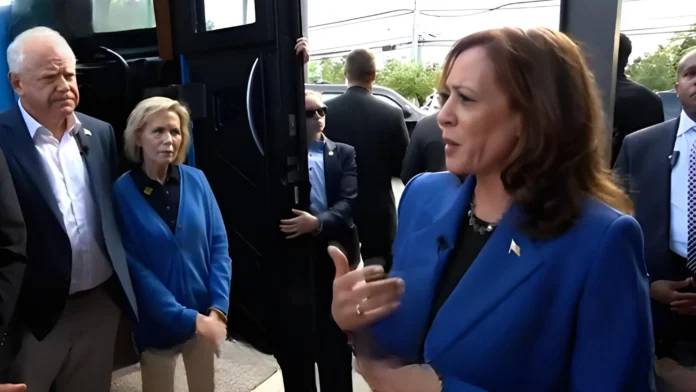
Kamala Harris, while campaigning in Pennsylvania, highlighted her comprehensive economic plan, reinforcing her commitment to building a stronger, more inclusive America.
The Vice President, joined by the Second Gentleman Doug Emhoff, Minnesota Governor Tim Walz, and his wife Gwen, spoke candidly about her vision for the nation’s future and the economic policies she aims to implement.
As she embarked on her campaign bus tour, Harris provided insight into her strategy to boost the economy, particularly through child tax credits, housing, and community investments.
During the interview, Harris expressed optimism about her plan, which she believes represents a “new way forward.”
She emphasized that the economic policies she intends to introduce are designed not just for immediate relief but for long-term prosperity.
Her focus keyword—economic plan—was at the forefront of her discussion, as she articulated how these initiatives would benefit American families and communities, fostering a robust and equitable economy.
One of the central points Harris addressed was the expansion of the child tax credit and the Earned Income Tax Credit (EITC).
She explained that by increasing these credits, particularly the $6,000 child tax credit for the first year of a child’s life, the return on investment would be substantial.
Harris underscored that during the first year of the Biden-Harris administration, these policies helped reduce child poverty by over 50%, a significant achievement she aims to replicate and build upon.
Harris also highlighted the importance of homeownership as a key element of her economic plan.
She noted that increasing homeownership not only enhances individual financial stability but also strengthens local economies.
By expanding the property tax base, communities can fund schools and other essential services more effectively, creating a virtuous cycle of growth and investment.
The Vice President was clear about her belief in the economic plan’s capacity to “pay for itself” through these returns on investment.
She argued that any discussion of public policy must include a critical evaluation of how such policies can generate long-term benefits.
Strengthening neighborhoods, boosting community economies, and investing in a broad-based economy are strategies Harris believes will ensure that “everybody benefits.”
Harris candidly admitted that she still considers herself an underdog in the race, emphasizing the importance of continuing to earn the trust and votes of the American people.
She stressed that this belief drives her campaign efforts, including the ongoing bus tour across the country.
The tour is an opportunity for Harris and her team to engage directly with voters, listen to their concerns, and build support for her vision of America’s future.
The campaign’s approach is deeply rooted in grassroots engagement. Harris and her team have been meeting with people in various communities, from high school football practices to local fire stations.
These interactions, Harris explained, are crucial for understanding the needs of different communities and ensuring that her policies address the issues that matter most to voters.
In response to a question about whether the campaign has ground to make up, Harris reiterated the need to earn every vote.
She emphasized that her campaign’s success depends on being present in communities across the nation and addressing the specific needs and concerns of the people.
This hands-on approach is designed to build trust and demonstrate Harris’s commitment to serving all Americans.
The conversation also touched on international issues, specifically the ongoing conflict in the Middle East.
When asked about Israeli Prime Minister Benjamin Netanyahu and the possibility of a ceasefire deal, Harris was cautious in her response, acknowledging that the situation is complex and that negotiations are ongoing.
She affirmed her commitment to working tirelessly towards peace, emphasizing that the administration would not give up on finding a resolution.
Harris’s remarks in Pennsylvania provided a comprehensive overview of her economic plan and campaign strategy.
Her focus on economic policies that foster community investment, reduce poverty, and promote homeownership underscores her commitment to creating a more inclusive and prosperous America.
As the campaign continues, Harris’s message is clear: every vote counts and every community deserves to be heard.



